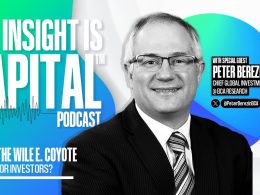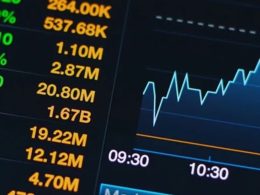by Senior Vice President, Portfolio Manager, Multi-Asset Solutions, Franklin Tempelton Investments
As widely expected, voters in Germany have re-elected Angela Merkel as their leader. While financial markets are unlikely to react strongly to this result in the short term, longer term there are signs the political and economic landscape in the European Union could be in for a shake-up. But Matthias Hoppe, senior vice president and portfolio manager, Franklin Templeton Multi-Asset Solutions, believes investors may have to wait longer than they expect for reforms.
Investors have been singularly disinterested in the run-up to the German general election, and with good reason. Few commentators expected anything other than a return to power for Angela Merkel, albeit without winning an overall majority in the Bundestag.
In the short term, we don’t expect confirmation of the result to impact significantly the current economic backdrop in Europe. For many investors, Merkel’s victory may look like an additional reason to hold European assets in order to capitalise on Europe’s already-strong growth.
In the longer term, the election outcome could determine the pace of European reforms. These reform efforts have been a supporting factor in driving sovereign spreads.
Much-Needed Eurozone Reform
After Emmanuel Macron’s victory in the French election earlier this year, optimism grew over the commitment of both France and Germany towards eurozone reforms. This optimism was partly reflected in the sharp tightening of sovereign spreads, in particular the spread between French bonds and the benchmark German bund.
At the same time, the risk of a eurozone breakup repriced sharply lower.
A widely held view is that Merkel, together with Macron, could now seek to implement fiscal policies designed both to stimulate the European Union (EU) economy and deepen European integration.
And, there is some hope that an alliance between Germany and France could drive the necessary structural reforms of the EU and euro area.
If those reforms were to be achievable, it could have substantial implications for capital inflows into equities and bonds in the region.
However, we believe bringing about those reforms is likely to prove difficult. Merkel’s general style of government has been more reactive than proactive; she hasn’t been known for pushing hard for changes and moving them forward. Also, depending on who she is going to seek a coalition with, it could prove more difficult to implement reforms.
Merkel has not been particularly forthcoming in her vision for Europe. Her Christian Democratic Union (CDU) party’s manifesto does not reveal a lot of details.
While the CDU declares a general openness to working with the new French government on the further gradual development of the euro area, and leaves some room for some regional solidarity, it remains adamant that rules need to be respected first.
The CDU agenda is, however, quite clear on ruling out the mutualisation of debt of eurozone countries, an idea proposed by other European governments that Macron has also discussed.
Some Areas for Possible Progress
There are some areas where we might expect some progress, although as ever, the devil is in the detail.
Both Germany and France seem keen on appointing a finance minister to represent the euro area. However, the process and ultimate design of such a position is still not defined.
Both countries have proposed a dedicated euro area budget, but the views differ on the size and the financing.
On the other hand, there seems to be agreement that the European Stability Mechanism (ESM) should be converted into a European Monetary Fund to regain independence from the International Monetary Fund (IMF).
Given these differences, a quick agreement looks improbable and reforms might be kicked down the road. Business as usual looks more likely, and reforms will prove more difficult than many investors anticipate. So market participants are likely to quickly focus on more pressing concerns such as the next steps to be taken by the European Central Bank (ECB).
What Does the German Election Mean for the German Economy?
In the short term, we do not believe the election and its result will have a meaningful impact on the economic outlook for Germany.
There’s a general expectation that healthy domestic demand, consumer spending and investment will continue to underpin healthy gross domestic product growth.
While the new government might push for a shy tax cut for the middle class or even agree on increasing infrastructure spending, as promised during the campaign, we doubt it would have any meaningful impact on equity markets.
The hope among most observers is that Merkel’s government will focus the next parliamentary term on long-term issues (as it will most likely be her last term) to secure a strong and stable German economy but also the future of the EU.
Despite strong economic performance, challenges to be addressed include: spending on infrastructure, education and digitalisation.
So while we think the financial markets’ reaction to this election result is likely to be muted in the medium to short term, longer term, the picture might be more difficult.
*****
The comments, opinions and analyses presented herein are for informational purposes only and should not be considered individual investment advice or recommendations to invest in any security or to adopt any investment strategy. Because market and economic conditions are subject to rapid change, comments, opinions and analyses are rendered as of the date of the posting and may change without notice. The material is not intended as a complete analysis of every material fact regarding any country, region, market, industry, investment or strategy.
Data from third-party sources may have been used in the preparation of this material and Franklin Templeton Investments (“FTI”) has not independently verified, validated or audited such data. FTI accepts no liability whatsoever for any loss arising from use of this information, and reliance upon the comments, opinions and analyses in the material is at the sole discretion of the user. Products, services and information may not be available in all jurisdictions and are offered by FTI affiliates and/or their distributors as local laws and regulations permit. Please consult your own professional adviser for further information on availability of products and services in your jurisdiction.
To get insights from Franklin Templeton delivered to your inbox, subscribe to the Beyond Bulls & Bears blog.
For timely investing tidbits, follow us on Twitter @FTI_Global and on LinkedIn.
Copyright © Franklin Tempelton Investments















